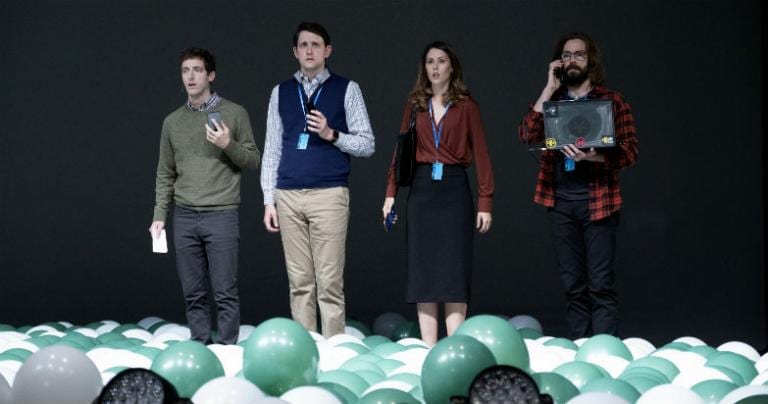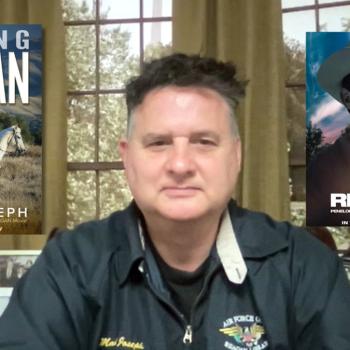
“Don’t be evil,” says Google, which probably knows more about my life than I do (and the same goes for you).
Six seasons ago, HBO’s tech comedy Silicon Valley began at a party, where a suddenly rich entrepreneur trumpeted how his innovation would “make the world a better place.” That was also the mantra of the show’s Big Bad, tech titan Gavin Belson (Matt Ross), a quivering mass of ego, insecurity, ambition, avarice, and ninja-level abilities to make life difficult for the show’s hero, coder-turned-CEO Richard Hendricks (Thomas Middleditch).
HBO has had some big-budget series purporting to explore the themes of Good vs. Evil, whether it’s True Blood, Game of Thrones, or this year’s Watchmen and His Dark Materials (which I wrote about here and here, respectively). But under the noses of all those vampires, dragons, superheroes and “The Magisterium,” creator Mike Judge’s half-hour of great writing, bad language, crude jokes, wild plot twists, indelible characters and computer mumbo-jumbo is one of the best morality plays I’ve ever seen on TV.
Starting back in 2016, I noticed this and started writing about how, when Richard tried to be honorable as he built his company, Pied Piper, he prospered. But, when he was tempted to do something unethical or illegal, it always ended in disaster. At an HBO party, I ran into Judge and told him I saw what he was doing, and he was glad to hear that it hadn’t gone unnoticed.
The show has also had nods to faith, sometimes in strange ways and at surprising moments. From the season-three premiere, out of the mouth of the bombastic Erlich Bachman (T.J. Miller), owner of the Santa Clara Valley “hacker hostel” in which Pied Piper was born:
I believe the actual Judas had the courtesy to kill himself after betraying his leader, Jesus Christ. He’s the CEO of the world, ever heard of him?
In the season-four finale, there was the unwitting destruction of a computer server nicknamed Anton, which, in its last moments, executed a function that saved Pied Piper. That led to an exchange between two Pied Piper originals, business-development expert Jared (Zach Woods) and deadpan engineer Guilfoyle (Martin Starr), related in a story I wrote in 2017:
Engineer Guilfoyle, a self-proclaimed Satanist whose most deep and enduring relationship may have been with his beloved equipment, observed that “Anton died so we might live.”
“Like Jesus,” said Jared, causing Guilfoyle to have an uncomfortable moment.
And then there are the subtle pro-life nods, like this one in a season-four episode called Blood Boy. Laurie Bream (Suzanne Cryer), head of Raviga, the venture-capital fund invested in Pied Piper, is pregnant — and fully aware that a co-worker plans to use it against her. Employee Monica (Amanda Crew), later to become Pied Piper’s CFO, comes to warn her.
Laurie takes it all in stride and assures Monica that she’s using the plot as an excuse to start a new company. As I recounted in another story from 2017:
Laurie: No. Even though your disclosure just not had absolutely no actionable value, it did reveal tremendous loyalty, so all is well now.
Monica: So you’re not mad at me anymore?
Laurie: No, Monica. I am a human being, just like you, like Ed Chen, (points to her belly) this.
This year, in the sixth and final season, the pro-life message raised its head again, also with Monica. Faced with a decision whether to take a massive investment from a shady source, Richard turns to Monica for advice — and she refuses to tell him what to do, exclaiming:
Monica: Look, when my sister got pregnant her freshman year of college, I said get an abortion. Well, now my niece, Dakota, who is very much with us, calls me “Aunt Abortion.” I’m sorry. You are the CEO; this is on you.
Meanwhile, Guilfoyle — who, despite the Satanic trappings, is essentially a functional atheist and alcoholic — lectures his co-worker and frenemy, the perpetually petty, scheming and greedy Dinesh (Kumail Nanjiani), about the perils of bad karma, saying:
In my youth, I would have argued that life is just a series of random events devoid of any meaning. But as a data scientist, I have to recognize that sometimes patterns emerge. Undeniable patterns. … Get right with the Universe.
If you haven’t seen the finale of Silicon Valley, leave now, watch it, and come back, because it was a humdinger.
After six years of toil, stress, terror, joy, hard work and whiplash-inducing reversals of fortune, the Pied Piper originals — Richard, Monica, Jared, Guilfoyle and Dinesh — are on the verge of making a deal worth billions and seeing their new network, based on Richard’s groundbreaking “middle-out” compression algorithm, launched to the world.
And, Richard has sworn that his network will ensure that all our data remains private and under our own control — something the real Internet constantly promises and seldom provides.
There’s just one problem. In order to make this new Internet work, it was given artificial intelligence and has taught itself how to break encryption. If loosed upon the world, it will destroy all privacy, from your cellphone to bank records to the nuclear launch codes. It will destroy the world.
The only way to save everything is for Richard and his friends to annihilate their life’s work — in a seemingly accidental way that will lose them billions but not land them in jail. Richard agonizes, but, in the end, decides to do the right thing, and his friends agree … mostly.
Knowing he’s too craven and selfish to be trusted not to sabotage the sabotage, Dinesh orders himself disconnected from the company.
But at the end, when more twists may result in the dangerous software actually being set free, Dinesh finds his conscience and ultimately is the one who saves the world — and impoverishes himself in the process.
The finale episode looks back on this from 10 years in the future, when all has turned out mostly well (except for Laurie, who is inexplicably in prison) — but this is Mike Judge, so there will always be a twist at the end.
At its conclusion, Silicon Valley‘s message was about how hard it is to keep your soul when those around you are selling theirs to the highest bidder — and that the reward of virtue is sometimes … nothing. Nothing, that is, except a clean conscience and the satisfaction of having listened to the better angels of your nature.
When’s the last time you saw that on TV? And with Silicon Valley gone, not sure when you’ll ever see it again.
Silicon Valley is available on HBO On Demand, HBO GO, HBO NOW and the upcoming streaming service, HBO MAX (which may eventually replace the other two), along with Amazon Prime.
Click here to watch a season 6 promo (language warning). Actually, while Silicon Valley has virtually no sex (definitely none shown), almost no nudity (I think there was a male backside shown once) and no real violence (unless you count Richard getting pinged by a BB gun), the epic levels of profanity in the show require any children to be sent … to the neighbor’s house.
Image: HBO
Don’t miss a thing: Subscribe to all that I write at Authory.com/KateOHare.


















